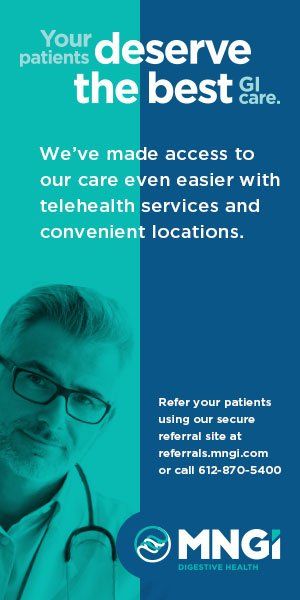Capsules
New Partnership Addresses Equity in Connecting Community Care
Stratis Health, in partnership with Collective Action Lab, has been commissioned by a local private funder to facilitate the co-creation of an initiative to support and facilitate referrals addressing social needs across multiple sectors in Minnesota. An open invitation to participate will launch the collaborative design of a sustainable shared solution for connecting people through culturally responsive methods with community resources such as health care, food, transportation, and housing. “We recently completed the first phase of this project to gauge interest across community, health care, payer, and state agency organizations for exchanging social needs referrals,” said Jennifer Lundblad, Stratis Health president & CEO. “We are very encouraged that more than 90% of respondents are interested and willing to participate in designing a common approach to optimize technology for the good of individuals and communities.” The new initiative will enable organizations to screen for and identify a range of needs and electronically refer them to responsive services. An added and powerful benefit is a “closed-loop” feedback mechanism to track how specific referrals are addressed and utilized. “Very often, initiative design and change of this nature is directed and designed by only one part of the overall system, and it is usually the part with money and power,” said Olivia Mastry from Collective Action Lab. “This project is exciting in that it embeds equity in the process itself by creating conditions and agency for all who are impacted by the changes to shape and drive the recommended solution.”
The process for co-creating a common social needs resource will include convening stakeholders to identify the operational, financial, and other “must-haves” from all perspectives. The first step is to establish a Guiding Council selected by and composed of members from a wide variety of stakeholders. Organizations involved in the earlier development process will be included in this next phase of the work, as well as other interested organizations. It is a “bring-a-friend” effort. If your organization was not involved in the first phase and would like to be going forward, contact Senka Hadzic (shadzic@stratishealth.org).
Hudson Hospital Announces Expansion Plans
Hudson Hospital & Clinic, a part of HealthPartners, has announced plans to expand primary care services to meet growing demand in the community. The project is expected to be completed in May. The addition of family medicine and pediatrics to the primary care clinic brings more physician services to the nearly 200,000-square-foot campus. This further provides the Hudson community with access to board-certified physicians in 15 primary and specialty care services, and a single location with one comprehensive medical record to meet all of the area’s health care needs. Hudson Hospital & Clinic is the largest provider of care in the region with primary care, urgent care, specialty services, 24/7 emergency medicine (11,000 annual emergency department visits on average) and inpatient services, as well as the city’s only full-service multispecialty clinic. The clinic also recently added options for extended hours, video visits, mobile check-in and online scheduling for a more convenient patient experience. “Continuing to expand our primary and specialty care services in Hudson is an important priority to keep care local and fully meet the needs of our community,” Hudson Hospital & Clinic President Tom Borowski said. “We know patients receive better, more coordinated care when they stay within a system, and we’re excited about this opportunity for the Hudson community to experience our primary care, medical and surgical services close to home.” Hudson Hospital has been serving the community since the 1950s. Since 1999, together with HealthPartners, Hudson has made significant investments to keep high-quality hospital and specialty care close to home for patients. “We always look for opportunities to improve the health and well-being of our community, whether it’s by expanding the health care services we offer or partnering with other groups in our community to address factors of health beyond our hospital and clinic walls,” Borowski said. Current community-focused initiatives include PowerUp, which encourages kids and families to eat healthier and move more, the Make It OK campaign to reduce the stigma of mental illnesses, and a wide variety of local, community-based organizations and events in which Hudson Hospital & Clinic proudly sponsors, supports and participates.
Southdale Hospital Adds 52 Single Occupancy Rooms
M Health Fairview Southdale Hospital has completed construction on two new floors of private patient rooms above the Carl N. Platou Emergency Center, adding approximately 38,000 square feet of space to the building. The new rooms are designed to be easily reconfigured for various needs–including both intermediate and intensive care. The expansion adds 52 new single-occupancy rooms, offering greater privacy and a better experience for patients and their families. The construction project began in 2020 and is part of a larger transformation process. The new rooms will provide improved privacy and comfort for patients throughout the hospital and allow the hospital to better adapt as community needs change. Every new room is designed to be easily reconfigured for different levels of care. These include intensive and intermediate care, which provides ongoing monitoring and specific supports. The rooms will also be available for medical/surgical use. This type of care provides support for patients before and after an operation, as well as for a variety of other medical conditions. “At M Health Fairview, we’re always looking for new ways to make compassionate individualized care accessible and more enjoyable for all,” said Jeoff Will, chief operating officer, acute care hospitals. “Sometimes, that’s as simple as giving our patients and their families more privacy during their stay.” Increasing the number of single-occupancy rooms will also improve infection prevention practices and decrease the potential for the spread of illness. “Our plans for this project have always been centered on improving the experience our patients have when they are in our care. We want patients to be comfortable and safe, and to know that they are getting the best care.” said Joe Knowles, director of nursing at Southdale Hospital.
MDH Opens Twin Cities Area Monoclonal Antibody Clinic
The Minnesota Department of Health (MDH) recently opened a new clinic in St. Paul to expand access to monoclonal antibody COVID-19 treatment in the Twin Cities metro area. COVID-19 monoclonal antibody treatment can help qualifying patients get better faster. It is an outpatient treatment for patients with mild to moderate symptoms that started within the past 10 days, and who are at high risk of their illness leading to hospitalization or death. “This clinic will strengthen the existing capacity of providers in the Twin Cities to give this life-saving treatment,” said Minnesota Commissioner of Health Jan Malcolm. “Patients and their providers seeking monoclonal antibody treatments can make an appointment at this clinic and other locations by using the state’s online tool, the Minnesota Resource Allocation Platform.” To receive this treatment, people who have tested positive for COVID-19 should contact their health care provider or visit the Minnesota Resource Allocation Platform (MNRAP) to request an appointment. The newly opened site is not a walk-in clinic. MNRAP is an online scheduling tool the state created during the pandemic to facilitate equitable access to monoclonal treatments. Patients or their caregivers can access MNRAP to find out if they qualify for treatment. The website will also refer them to the nearest site with an available appointment, including the new St. Paul clinic. MDH is partnering with Matrix Medical Network to operate the medical clinic, located near Interstate 35E and Arlington Avenue West.
Allina CEO Announces Retirement at Year End
Dr. Penny Wheeler has announced her plan to retire at the end of 2021 after a career at Allina Health spanning decades as a physician, President of the Abbott Northwestern medical staff, Chief Medical Officer and finally as CEO since 2014. Wheeler will remain on the Board of Directors after she transitions out of the CEO role. The Board of Directors named Lisa Shannon, currently serving as the President and Chief Operating Officer, as Wheeler’s successor. “The community, countless patients and families, and Allina Health have benefited in innumerable ways from the passion, commitment and servant leadership of Dr. Penny Wheeler,” said Deb Schoneman, Chair of the Allina Health Board of Directors. “We thank her for her decades of incredible service and contributions to Allina Health. Penny leaves an indelible mark on our organization and her legacy of leading systemic changes to better support whole person care, diversity, equity and inclusion, as well as payment model reform, will continue to benefit the communities we serve well into the future. We are grateful she will remain engaged with the organization on the Board of Directors.” Wheeler plans to fully transition CEO leadership duties at the end of 2021. Lisa Shannon assumed the President title in 2020 and the two will continue their close partnership and collaboration throughout the transition. “My journey has been inextricably linked with Allina Health since the day I was born at Abbott Northwestern Hospital,” said Wheeler. “It has been the ride of a lifetime and I am filled with tremendous gratitude and pride for what we have collectively been able to accomplish in service of others over the years. Allina Health has enabled me to fulfill my purpose to improve the lives of others as both a physician and as a leader. Along the way, I have collected countless stories from those who I have been so privileged to meet. It is those stories that I will miss the most, but the timing is right for me to step away. I have tremendous gratitude and optimism for the future of Allina Health under Lisa Shannon’s incredible leadership.”
BC/BSMN Adds Community Health Services to Benefit Set
Becoming the first non-public insurance company in the state to provide free access to community healthy care workers, Blue Cross and Blue Shield of Minnesota (Blue Cross) announced it will begin offering these benefits to commercial health plan enrollees. As part of a continuing effort to improve the health of members by addressing the societal factors that impact health, effective January 1, 2022, regardless of specific plan renewal dates, Blue Cross will cover services delivered by community health workers across all fully insured commercial health plans. These include Individual and Family plans − both on and off MNsure − in addition to small and large fully insured employer groups (plans in which Blue Cross designs the benefit structure and pays for covered health care costs). Commercial plans in which employers design their own health benefits and pay for their own health care costs − known as self-insured plans − will also have this new benefit available for 2022. Community health worker programs focus on culturally appropriate assistance and education provided by front-line public health professionals who work in conjunction with primary care providers. Additionally, community health workers serve as liaisons between individuals, the health care system, health insurers and social service agencies. Through community outreach, social support and patient advocacy, community health workers are key to bridging gaps in communication and improving health outcomes in communities with cultural and language barriers. “Navigating the complexities of the health care ecosystem is even more challenging when facing cultural, language, and other sociodemographic barriers that affect our members’ health,” said Dr. Mark Steffen, chief medical officer at Blue Cross. “Community health workers play a crucial role in advancing health outcomes and reducing inequities that disproportionally affect BIPOC (Black, Indigenous, and people of color) communities.” “Community health workers have been instrumental in helping our Medicaid members achieve their optimal health for more than a decade,” said Paul Valley, vice president of commercial sales. “By expanding this benefit to our commercial member population, Blue Cross is taking a significant step toward making health care more equitable, sustainable and affordable for all.”
New CPT Code for COVID-19 Booster
The American Medical Association (AMA) has recently announced that the Current Procedural Terminology (CPT®) code set has been updated to include a new code for booster doses of COVID-19 vaccine created by Johnson & Johnson. The new CPT code for the booster dose of the Janssen COVID-19 vaccine joins unique CPT codes previously issued to COVID-19 vaccine booster doses from Moderna and Pfizer. The CPT codes for reporting COVID-19 vaccine boosters from Janssen and Moderna are effective for use as of Oct. 20. The CPT codes for the Pfizer boosters were made effective on Sept. 22. As with all the CPT codes related to COVID-19 vaccines, the effective dates coincide with the emergency use authorization issued by the FDA. For quick reference, the new code assigned to the Janssen booster for the COVID-19 vaccine is: 0034A.
MORE STORIES IN THIS ISSUE











